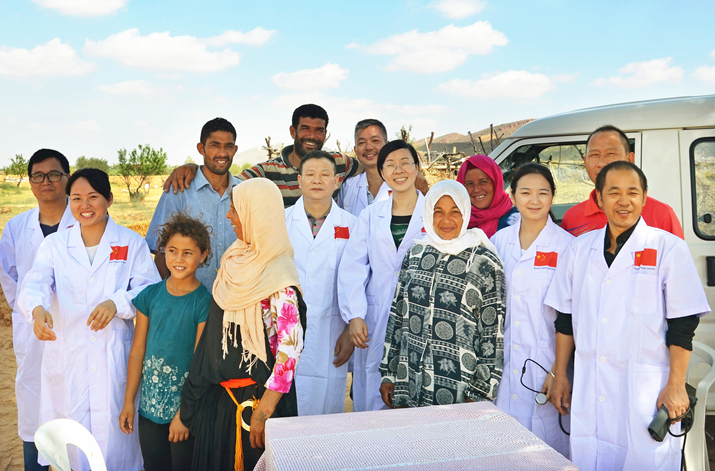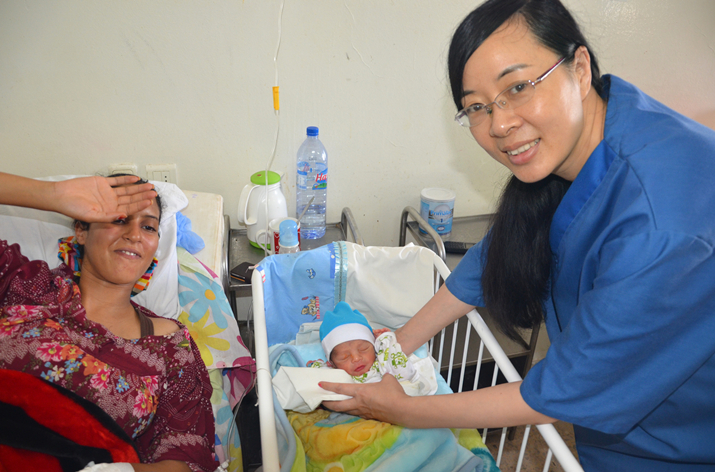|
||||||||||
| Home Nation World Business Opinion Lifestyle ChinAfrica Multimedia Columnists Documents Special Reports |
|
||||||||||
| Home Nation World Business Opinion Lifestyle ChinAfrica Multimedia Columnists Documents Special Reports |
| Lifestyle |
| Divided Loyalties |
| A Chinese obstetrician battles cancer at home but worries about her patients back in Tunisia |
| By Liu Jian ·2017-05-16 |

Guo Luping (sixth right) and other Chinese medical professionals with local patients after free checkups in rural Tunisia
Guo Luping had to break the promise she made to her Tunisian patients. The Chinese obstetrician worked in Tunisia for 15 months on a Chinese medical aid program to the country. When she came back to her hometown in southeast China's Jiangxi Province in 2016, she got bad news. The 41-year-old doctor was diagnosed with mid-to-late-stage breast cancer. Having helped countless patients abroad, the doctor now had to care about her own health.
Guo had a successful surgery soon after the diagnosis, but she then asked to leave the hospital before completing the prescribed chemotherapy treatment. Guo's doctor, Xiong Qiuyun, a cancer specialist with the Third Hospital of Nanchang in the province's capital, said he was concerned because she had not seeked medical treatment earlier. He persuaded her to keep her plans on hold for the time being.
Today, even as she remains hospitalized for treatment in Nanchang, Guo said she hopes to return to Tunisia. "Before coming back to China, I had already booked my return ticket and promised several patients that I would help deliver their babies," she said. "But I had to break my promise. This makes me feel quite uneasy."
Volunteer from the start
Before going to Tunisia, Guo worked at the Maternity and Child Care Center of Xinyu City, Jiangxi Province. Upon hearing of the medical aid program to Africa, she was quick to volunteer.
Since 1973, the province, like many others in China, has been sending medical professionals to treat patients and provide training to doctors at local hospitals across Tunisia and Chad.
Usually, more than 40 doctors and nurses from Jiangxi are selected for the team every two years, according to Zhang Yue, Director of the International Cooperation Department, Jiangxi Health and Family Planning Commission. But recruiting medical team members has proven difficult. "When doctors leave for such program in Africa, they may be afraid to fall behind colleagues back home, due to the fast development of China's medical sector," explained Zhang.
But to Guo, the decision to enroll in the mission came easily. "I applied to join this program because I hoped to broaden my horizons with overseas work experience, though I knew it's hard, tiring and even dangerous to work in Tunisia," she told ChinAfrica.
Guo went to the Sidi Bouzid Regional Hospital in Sidi Bouzid Governorate in central Tunisia, as a member of China's 21st medical team to the country. Despite the difficult working conditions and communication problems, she devoted herself to her patients as soon as stepped onto the sun-scorched Tunisian soil in 2014.
Busy life in Tunisia
Located not far from the Sahara Desert, the Sidi Bouzid Regional Hospital serves the surrounding communities over an area of more than 100 square km. While receiving up to 500 pregnant women for delivery every month, the obstetrics department where Guo worked only had three doctors and over 60 nurses. Among the three doctors, two were Chinese.
"Women in Tunisia usually have four to five children, but the country lacks obstetricians," Guo said.
It makes things worse that there is only one operating room for the obstetrics department. It happens sometimes that one woman was inside to deliver her baby, while a few more mothers-to-be were waiting outside for emergency treatment, according to Guo.
"To increase efficiency, I proposed to do obstetric operations in other available surgery rooms, so that more operations could be done, saving valuable time for women waiting for urgent delivery," she said.
Her proposal has saved patients' valuable treatment time, yet leaving doctors no time to rest. "We were racing against time every day, and sometimes I would perform up to six or seven operations per day," said Guo, recalling her busy life in Tunisia.
While in Sidi Bouzid, Guo always remained on call whenever she was not on duty. "Tunisian pregnant women came to the hospital on an ox or horse-cart, bumping all the way along the rough road. Some even walked barefoot for several hours to see the doctor. How could I refuse them?" she told ChinAfrica.

Guo Luping checks the health conditions of the mother and baby in the obstetrics ward at Sidi Bouzid Regional Hospital in Tunisia
In July of 2015, Guo noticed a lump in her left breast, which grew larger by October, but she didn't pay much attention. "There were so many patients and I was too busy to worry about my own problem," she said.
Even so, as an experienced obstetrician, Guo had a feeling something was wrong. "But I thought it was still in an early stage, and I just wanted to stay there and try to help as many people as I could," she recalled.
Even as her condition deteriorated, Guo kept working for five more months. "I thought if I stayed one more day, I could help a few more patients, do a few more surgeries, and then more lives would be saved," she said.
Saving lives
Guo recalled a memorable experience. At four o'clock on a March morning of 2015, a Tunisian pregnant woman was sent to her hospital. Her uterine contractions suddenly became stronger and more frequent. The fetal heart rate dropped to 80 beats per minute, far below the normal rate of 120 to 160 beats.
Based on nearly 20 years of clinical experience in obstetrics, she decided it was a case of acute fetal distress, meaning the unborn baby was not receiving adequate amounts of oxygen and could die any minute.
At such a critical moment, every second counts. Guo quickly administered a local anesthesia and delivered the baby through a Caesarean section.
Luckily, the baby was safely taken out of the womb, where less than 100 ml of amniotic fluid was left. To everyone's surprise, the umbilical cord was tightly wrapped around the baby's body. Taking the baby out took Guo only three minutes.
The operating room was filled with joy and excitement. The medical personnel gave Guo the thumbs up and kept on saying, "Chinese doctors are great!"
"It was a race against time. This case not only demonstrated my operating skills, but also confirmed Chinese doctors' professional ability," wrote Guo in her surgical notes.
Leaving a legacy
During her 15-month stay in the country, Guo did 496 operations, and the hospital's fetal mortality rate dropped significantly. She feels her work, although exhausting, was worthwhile. In addition, it fostered local people's trust in Chinese doctors, which was especially rewarding for her. "Every day, I felt proud that I could help so many people in need," she said.
Though she is now confined to a hospital bed in China, Guo's commitment to her patients in Tunisia remains as strong as before. "It's a doctor's duty to treat patients and I am honored and proud to be a member of China's medical team serving in Africa," she told ChinAfrica.
(This work was sponsored by the Africa-China Reporting Project managed by the Journalism Department of the University of the Witwatersrand, South Africa)
| About Us | Contact Us | Advertise with Us | Subscribe |
| Copyright Beijing Review All rights reserved 京ICP备08005356号-5 京公网安备110102005860号 |